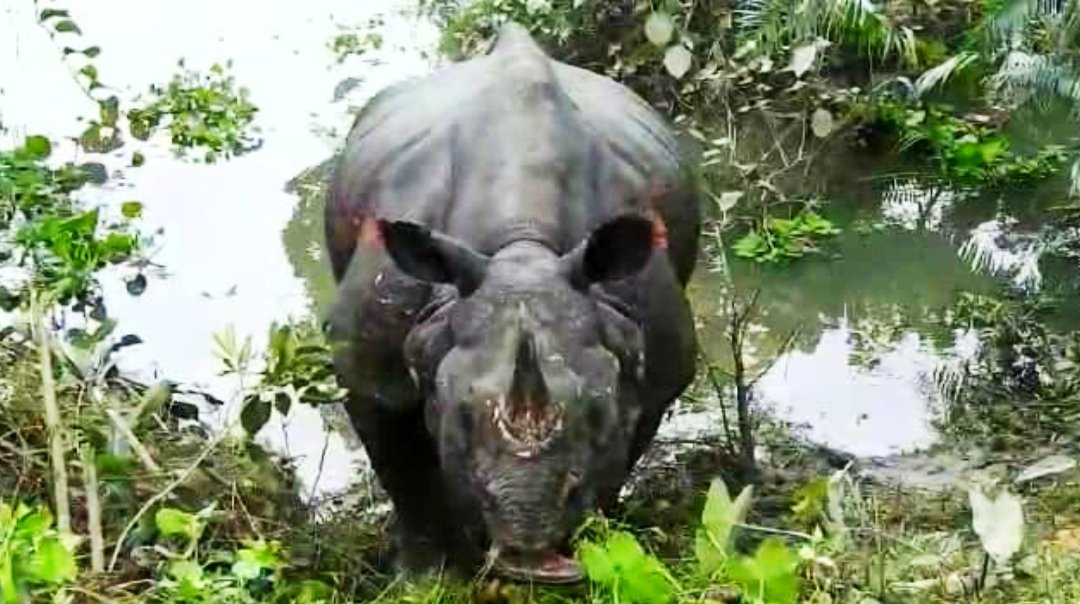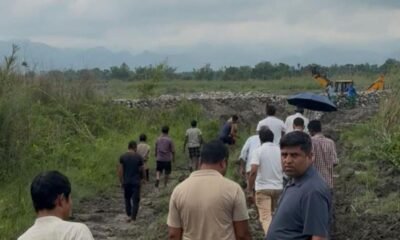Animal
9 rhinos among over 100 animal deaths in Assam’s Kaziranga during floods

Nine rhinos are among the 108 wild animals that have died during this year’s floods at Assam’s Kaziranga National Park and Tiger Reserve (KNPTR). However, active efforts by authorities aided in the recovery of an exhausted rhino who had strayed on to the national highway on Saturday.
On Saturday, the carcass of a female rhino that had died due to drowning was found in the central range of the park. Last month, one rhino had died due to natural causes in the western range of the park. All the other deaths are due to drowning, confirmed KNPTR officials.
According to a bulletin issued by park authorities on Sunday, nearly 85% area of the park, spread over 430 sq km is underwater at present. Forty-three of the 223 forest camps inside the park are inundated of which 6 have been vacated.
Till now, 60 animals (36 hog deer, eight rhinos, three wild buffalo, one python, seven wild boar, two swamp deer, one Sambar and two porcupines) have died due to drowning. Fifteen hog deer have died after getting hit by vehicles on national highway 37 close to the park while trying to cross it to escape floodwaters.

Fifteen rescued animals died during treatment at the Centre for Wildlife Rehabilitation and Conservation (CWRC), located near the park.
According to the KNPTR bulletin, 51 animals have been injured due to floods and one by a speeding vehicle. Till date, 134 animals have been rescued. Of them, 110 have been released into the wild, while 8 others including a one-year-old female rhino calf are under treatment at CWRC.
On Saturday, an adult male rhino had strayed out of the park and rested for several hours on NH37. The animal, which was being guarded by police and forest personnel, moved back to the park on Sunday morning.
“The animal was very exhausted as it was in the water for 3-4 day and we were planning to shift it to the state zoo in Guwahati. But after resting for several hours it moved back inside. We are keeping a watch on it,” said P Sivakumar, director KNPTR.
Annual floods are common in Kaziranga, the biggest habitat of one-horned rhinos. The park has around 2,400 rhinos and 121 tigers. Last year, floods had claimed nearly 200 animals in the park, including 18 rhinos.
“The rhino which came out of the park had some vision impairment and was extremely exhausted. We gave it treatment as well as multivitamins after which it recovered and started movement,” said wildlife veterinarian Shamshul Ali.
Bibhab Talukdar, the CEO and Secretary-General of Aaranyak, a wildlife NGO, stated that though Kaziranga experiences several waves of floods each year, this season it is a bit severe as there has been not much respite in between.
“When there’s frequent flooding, the animals don’t get enough time to recover. They are usually exhausted easily and hungry as well. Since the animals move towards higher locations in Karbi Anglong after crossing NH37, it is very crucial to protect that area from human intervention,” he said.
With inputs from Hindustan Times
News from Assam Floods
Follow our page Times of Northeast on Facebook















